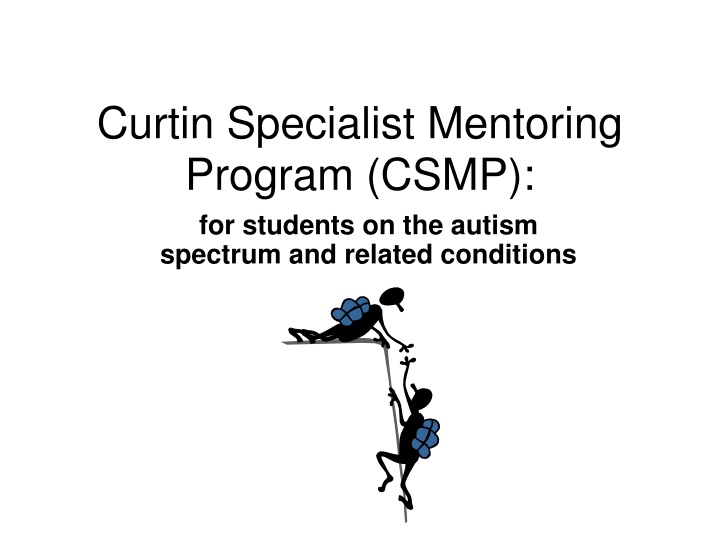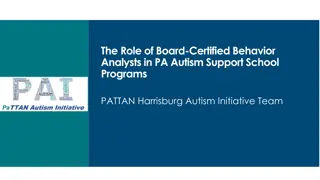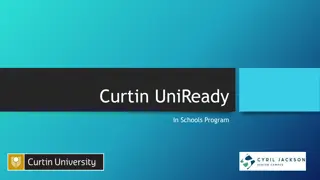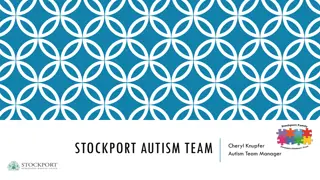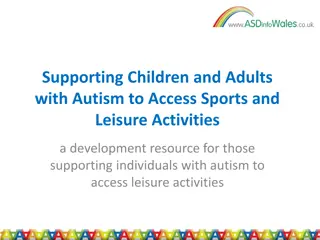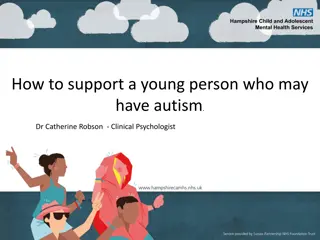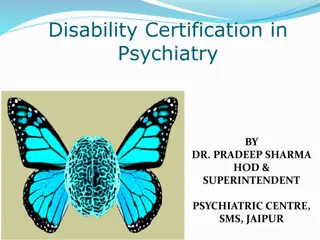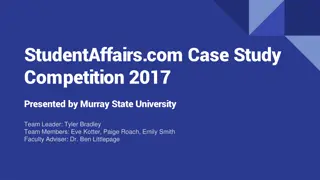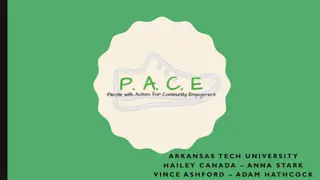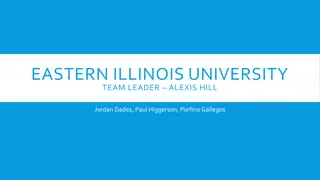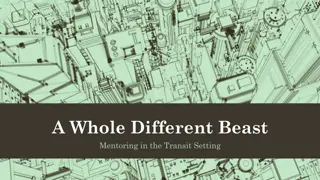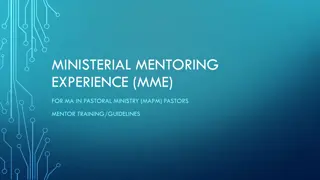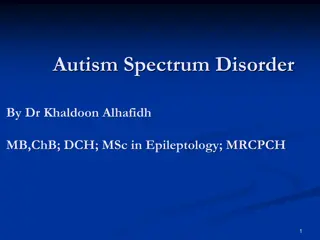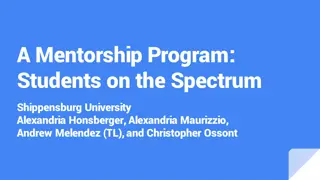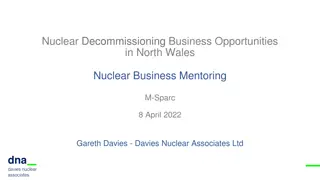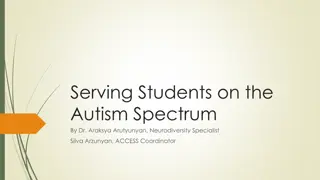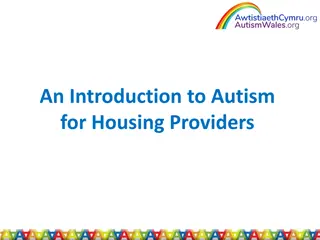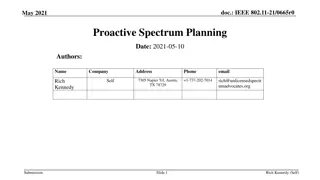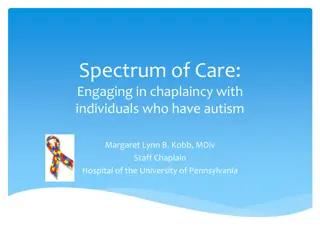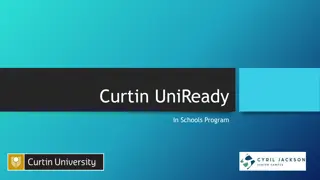Curtin Specialist Mentoring Program (CSMP) for Autism Spectrum Students
The Curtin Specialist Mentoring Program (CSMP) is designed to support tertiary students on the autism spectrum and related conditions by providing specialist mentoring and necessary accommodations. The program addresses the increasing rates of autism spectrum disorder diagnoses in Australia and the challenges faced by high-functioning autism individuals in tertiary education. Through collaborative efforts and research-backed strategies, CSMP aims to enhance student success and well-being.
Download Presentation

Please find below an Image/Link to download the presentation.
The content on the website is provided AS IS for your information and personal use only. It may not be sold, licensed, or shared on other websites without obtaining consent from the author.If you encounter any issues during the download, it is possible that the publisher has removed the file from their server.
You are allowed to download the files provided on this website for personal or commercial use, subject to the condition that they are used lawfully. All files are the property of their respective owners.
The content on the website is provided AS IS for your information and personal use only. It may not be sold, licensed, or shared on other websites without obtaining consent from the author.
E N D
Presentation Transcript
Curtin Specialist Mentoring Program (CSMP): for students on the autism spectrum and related conditions
History Mid 2013 - Meeting with UWA, Curtin & Telethon Kids Institute to discuss support needs/research regarding tertiary students with high functioning autism (HFA). All agree something needs to be done! Mid/Late 2013 - Joint funding sought through both UWA & Curtin to set up specialist mentoring programs. Mid/Late 2013 - Curtin funds a staff member (Theresa Kidd) for one day per week to begin a pilot program in 2014. UWA unable to do so. Late 2013 - Autism West offers to fund Dr Jasmine McDonald to support Theresa Kidd in developing pilot program. Early 2014 to now CSMP develops according to best practice research, staff & student input and need.
Why is this program needed? Rates of autism spectrum disorder (ASD) diagnosis are increasing in Australia (Buckley, 2013). No. of Australians diagnosed with ASD doubles every 5 years approx. (Buckley, 2013). June 2012 (Centrelink data Carer allowance) - 53,428 Australian children aged under 16 years diagnosed with either Autistic or Asperger s Disorder (ie. 1 in 61.5 of school-aged children) (Buckley, 2013). More young adults with high functioning autism (HFA) are entering tertiary study and will need appropriate support and accommodation to succeed. Current international research indicates these young adults are significantly disadvantaged regarding employment, social relationships, physical /mental health and quality of life (Howlin & Moss, 2012).
Why is this program needed? Survey of 300 Australian adults with HFA indicated that: They experience significant struggles to realise their full educational potential. 80% had tried tertiary study. 75% indicated they needed support. 50% indicated they received no or insufficient support. (Aspect, 2012) Disability Officers reported this group s difficulties with verbal comprehension, planning, organisation, social awareness and group work (Aspect, 2012). Disability Officers reported a general lack of awareness and understanding of autism among tertiary educators (Aspect, 2012).
What works? Limited current research indicates: Promising ASD specialist support programs are presently operating in a small no. of universities/colleges in UK, USA and Canada v. limited in Australia. A community of practice occurs driven by student and staff input. Support is given in the areas of: transition, accommodation, online resources, diagnosis, specialist mentoring, staff awareness training, universal design for learning, careers advice, work experience, social awareness and sensory difficulties. Specialist peer mentoring is nominated as an important resource to help students navigate university life and develop increased independence and self-advocacy. A social group is also nominated as important to help develop social skills and a sense of belonging at university.
Who is a CSMP Mentor? A postgraduate Psychology or Occupational Therapy (OT) student who uses their own educational success at Curtin to help guide a student on the autism spectrum to become a more successful student in terms of their: retention academic success emotional well-being
What does a CSMP Mentor do? Meet / Communicate (all forms) regularly with mentee. Understand their mentee s individual profile/background. Be flexible and individualize their support program. Ensure mentee is registered with Curtin Counselling Disability Services (CDS) & has a Curtin Access Plan to gain accommodations. Build on their mentee s short and long term life goals. Link their mentee to appropriate Curtin services and clubs to support their academic, social, emotional and employment needs and goals. Encourage their mentee to attend the Curtin Social Group (CSG) to develop their social skills, friendships and sense of belonging at university.
How does CSMP work? CDS recommends suitable mentees (internal/external). CSMP also advertise through radio, parent networks etc. Mentors receive Student Transition And Retention Team (START)mentor and CSMP training prior to semester. Mentees provide a detailed intake form. Mentees and Mentors communicate on an as needs basis. Mentors and mentees are encouraged to attend CSG. Regular weekly supervision meetings occur to ensure mentors/coordinators receive adequate support and follow up. Mentors are paid through Commonwealth and University funding.
Who was involved in 2014? 9 Mentors: 5 OT Postgraduate Students 1 (male) 4 (female) 4 Psychology Postgraduate Students 4 (female) 17 Mentees: 14 Internal Students - 10 (male) 4 (female) 3 External Students - 3 (male) (16 retained for 2015) 3 Social Group Coordinators: 2 Psychology Honours Students - 2 (female)
Who else was involved in 2014? 2 CSMP Coordinators (part-time). Disability & Counselling Staff (as needed). 2 Psychology Masters Students conducting independent CSMP training & program evaluations (Results early 2015).
What do those involved think of our program so far? The mentor program for me has given more confidence in what I want to do when I leave university and has also given me something to look forward to during the week along with some new friends. It also allows me to seek help from those who understand my condition and have the ability to talk to someone when there is no one else to talk to. Plus being able to recognize people around campus makes the place feel less big and full of strangers. CSMP Mentee.
What do those involved think of our program so far? Going into university for the first time was challenging and scary yet exciting all on its own. Struggling with new situations, structure and community made the mentoring program such a vital safety net and building bridge in becoming my own person and making a name for myself. Although I went into university with outside friends on the other side of campus, the program gave me a mentor that helped make and keep friends in my degree and yet support me with regular conversations, meetings and information. I've been a part of programs like this before and nothing compares to support, care and thrive for my success it offers. CSMP Mentee.
What do those involved think of our program so far? My son is a first year Curtin university student studying Physics and Engineering. Being autistic, he finds it difficult to fit into general social environments, and consequently to make friends and feel accepted. However, the mentoring program has been instrumental in helping him settle into university life, alleviating the enormous stress he had initially been suffering. He has found guidance, support, friendship and understanding.The weekly group meetings have also been a wonderful part of the program. They have been fun and informative and allowed my son to make friends and meet people who understand him, in a safe and supportive environment. Without this fantastic program C. (mentee) would still be feeling anxious and isolated. Thank you, from a very grateful mother. CSMP Parent.
What do those involved think of our program so far? My son would not have made it through the 1st semester without the help of his mentor. The mentoring program has given B. (mentee) the best start we could have hoped for. Without the mentor program he would have given up his studies. CSMP Parent.
What do those involved think of our program so far? The mentoring program offers the mentees a rare opportunity to meet like-minded people their age and fosters the development of interpersonal relationships. There is a scarcity of such opportunities for adults on the spectrum. My mentee has been at Curtin for 3 years and had never made any friends. He now attends the weekly social club meetings as well as plays cards with another mentee weekly. These social gatherings mean a lot to my mentee, he continually indicates that he wants to improve his social skills. I believe the mentoring program provides him with an opportunity to reach this goal. CSMP Mentor.
What are out Future Directions? To gain appropriate, recurrent funding to allow CSMP to continue operating after 2015 (Curtin / Autism West). To gain philanthropic funding to provide scholarships, a dedicated psychologist and an appropriate study space/common room on campus. To continually improve and expand CSMP over successive years based on evaluation results and stakeholder feedback. To increase linkage of mentees with employment/work experience opportunities. To support the expansion of specialist mentoring to other Curtin disability groups. To utilise funds gained through the Autism Cooperative Research Centre (CRC) grant to allow CSMP to be replicated and evaluated at UWA in 2015/16. To produce a best practice module based on UWA / Curtin experience that will be available to other tertiary institutions through the Autism CRC website.
References Ames, M., McMorris, C., Hancock, L., Bebko, J., & The York University Asperger Mentorship Program (Schroeder, J., Brown, S., McFee, K., Goldstein, G., Wells, K.). (2010). Evaluation of the York University Asperger Mentorship Program International Meeting For Autism Research, held in Philadelphia, PA, 23/4/2014: York University. Retrieved from https://imfar.confex.com/imfar/2010/webprogram/Paper7069.html Ames, M., McMorris, C., Hancock, L., McFee, K., Bebko, J., & The York University Asperger Mentorship Program (Schroeder, J., Brown, S., Goldstein, G. & Wells, K.) (n.d.). [Evaluation of the York University Asperger Mentorship Program]. Attwood, T. (2007) The Complete Guide to Asperger s Syndrome. London: Jessica Kingsley Publishers. Autism Spectrum Australia (Aspect). (2012). We Belong: Investigating the experiences, aspirations and needs of adults with Asperger s disorder and high functioning autism. Sydney: Author.
References Buckley, B. (2013). Data describing Autism Spectrum Disorder in Australia. Paper presented at Asia Pacific Autism Conference 2013, Adelaide, Australia. Hastwell, J., Harding, J., Martin, N., & Baron-Cohen, S. (2013). Asperger Syndrome Student Project, 2009-12: Final Project Report, June 2013. Retrieved from University of Cambridge, Disability Resource Centre website: http://www.admin.cam.ac.uk/univ/disability/asperger/project.html Howlin, P. & Moss, P. (2012). Adults With Autism Spectrum Disorders. The Canadian Journal of Psychiatry, 57(5), 275-283. Wolf, L.,Thierfeld Brown, J. & Kukiela Bork, G. (2009). Students with Asperger Syndrome: A Guide for College Personnel. Shawnee Mission, Kansas: Autism Asperger Publishing Co.
